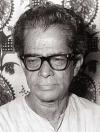Biography
Premendra Mitra was a renowned Bengali poet, novelist, short story writer and film director. He was also an author of Bangla science fiction and thrillers.
Life
He was born in Varanasi, India, though his ancestors lived at Rajpur, South 24 Parganas, West Bengal. His father was an employee of the Indian Railways and because of that; he had the opportunity of travelling to many places in India. He spent his childhood in Uttar Pradesh and his later life in Kolkata & Dhaka. He was a student of South Suburban School (Main) and later at the Scottish Church College in Kolkata. During his initial years, he (unsuccessfully) aspired to be a physician and studied the natural sciences. Later he started out as a school teacher. He even tried to make a career for himself as a businessman, but he was unsuccessful in that venture as well. At a time, he was working in the marketing division of a medicine producing company. After trying out the other occupations, in which he met marginal or moderate success, he rediscovered his talents for creativity in writing and eventually became a Bengali author and poet.
Married to Beena Mitra, he was, by profession, a Bengali professor at City College in north Kolkata. He spent almost his entire life in a house at Kalighat, Kolkata.
As an Author & Editor
In November 1923, Mitra came from Dhaka, Bangladesh and stayed in a mess at Gobinda Ghoshal Lane, Kolkata. There, he wrote 2 stories and sent them to the popular Bengali journal Probasi (meaning: The Exile). His first published work was Shudhu Keranee in Probasi in March, 1924. In the following issue, another story, Goponcharini was published.
His poems were better known for their sharpness and wit. They also expressed empathy for the sufferings of the proletariat. Five years earlier, in 1925, when Rabindranath Tagore wrote Punoshcho, the first universally accepted Bangla prose-poetry book, Mitra wrote some poetries in the magazines, Bijli, Kali Kalam, etc. which are of that kind. Buddhadeb Bosu thus wrote: The first book of poetry was Prothoma (1932).
His short stories were well-structured and innovative, and encompassed the diverse to the divergent in urban Indian society. The themes of poverty, degradation, caste, the intermittent conflict between religion and rationality and themes of the rural-urban divide are a thematically occurring refrain in much of his work. He experimented with the stylistic nuances of Bengali prose and tried to offer alternative linguistic parameters to the high-class elite prosaic Bengali language. It was basically an effort to make the Bengali literature free from softness, excessive romance and use of old style of writing which were prevalent in older writings. Nana Range Bona is not only a short story collection, but it is the only known autobiography of Premendra Mitra. He edited Bengali journals and news-magazines like Kollol, Kali Kalam, Banglar Kotha, Bongobani etc. He also wrote in Mouchak, a magazine run by Sudhir Chandra Sarkar.
He was connected to the Akashbani at first as a producer, later he performed other duties.
He even wrote brilliant and innovative science fictions and thrillers. Those are based on firm scientific temperaments and facts. Two of his most well-known stories are Piprey Puran (The Story of the Ants) and Mangalbairi (The Martian Enemies).
Although these are more popular among Bengali-speaking school children and teenagers, they are popular among an older generation of literary aficionados as well. In particular, his creation of the character of Ghanada (meaning: 'Elder brother Ghana' in Bangla) may be seen from many perspectives: although Ghanada is apparently an uninterested unemployed middle aged male, tall & thin, and who can apparently weave adventures almost at the drop of a hat, the adventures themselves cover themes ranging from crime, human ingenuity, science, history, geography, metaphysics and philosophy. In terms of facts, they are amazingly accurate. It is obvious that while Ghanada himself has not been involved in any of the adventures he claims to have taken part in, he is certainly a very learned man with an exceptional gift for storytelling. Ghanada may be seen as Mitra's parody or caricature of the Bengali urban middle class celibate intellectual, who is at home in the world of books and knowledge, but has little practical experience whatsoever. It is also interesting to note that like Satyajit Ray's Feluda, the older Ghanada although not abhorring the opposite sex, is not entirely at ease with them either. He stays at an all-male hostel and maintains an almost frugal existence. Ghanada is a self-educated person and his education is mostly due to time spent at the local libraries. In a way, it could be argued that these stories also reflect larger patterns of social transformations.
Another masterpice of his creation was the character of Mejokorta (meaning: 'the next brother of the eldest son of a family' in Bangla). Mejokarta was a famous "Bhoot Shikari" (meaning: Ghost-hunter in Bangla). The series of Mejokarta, although not as long as that of Ghanada, has left its prominent mark in the genre of ghost stories in Bangla.
Mitra's literary works were included in the curriculum of school level, secondary, higher secondary and graduation level Bengali literature in Bangladesh & West Bengal. ..






